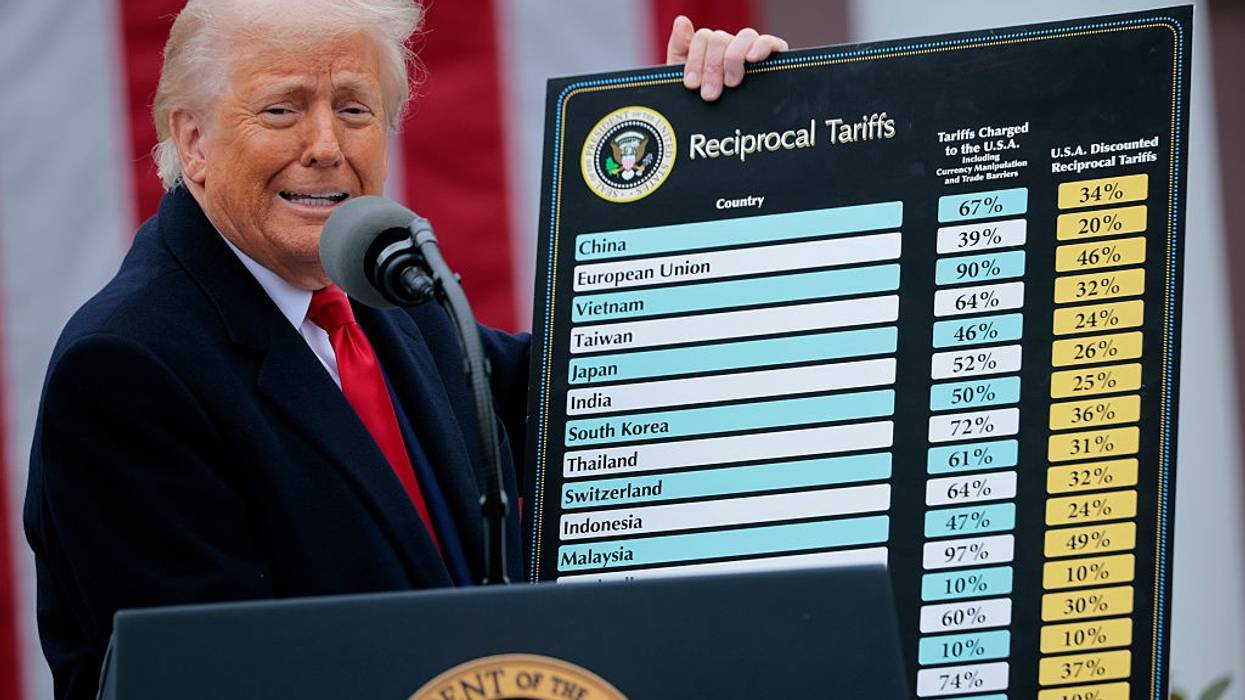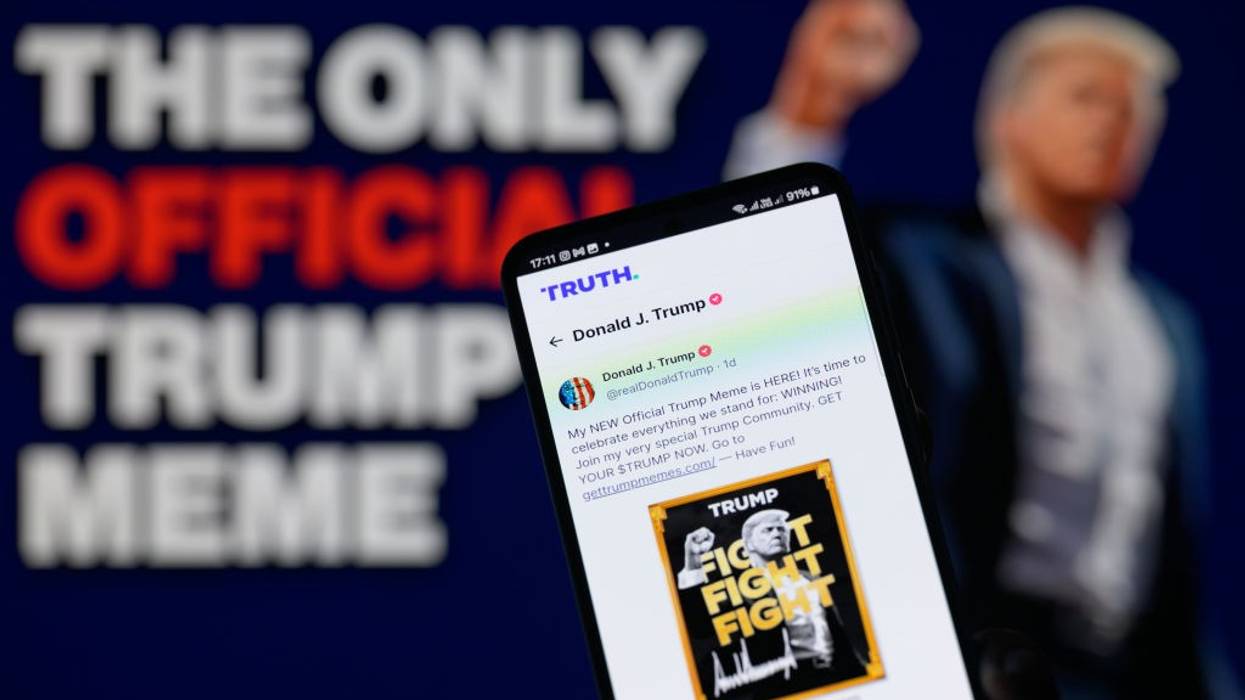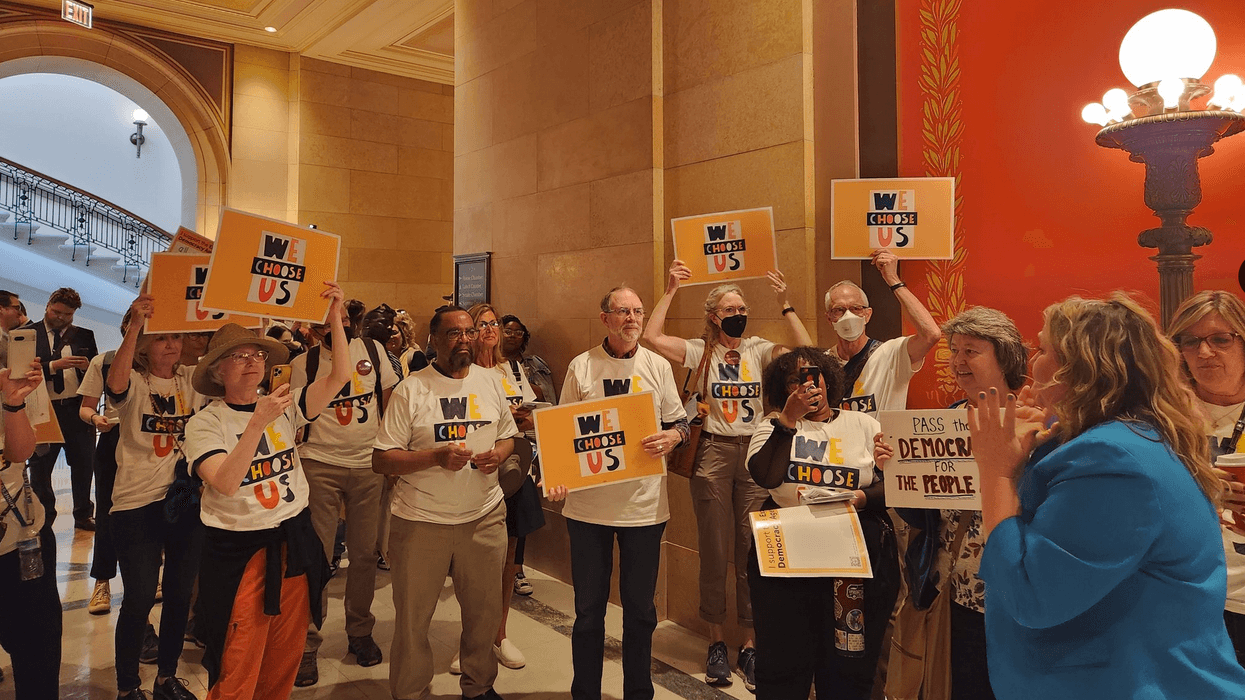Trump's Tariffs Are Extremely Dumb, Just Not For The Reasons You Might Think
This is a con on a global scale. Trump is not rejecting the corporate trade model. He’s weaponizing it.
On April 2, Donald Trump declared a national emergency and announced sweeping tariffs on nearly all imported goods. The headlines were dramatic — tariffs on China, allies like Canada and Mexico, and everything from cars to coffee beans. His administration framed the move as a patriotic stance for “reciprocal trade” and economic sovereignty.
Don’t be fooled. This isn’t the collapse of “free trade.” It’s the continuation of corporate globalization — just with a MAGA bumper sticker slapped on it.
Trump says he’s standing up for American workers. But he’s the same president who signed the United States-Mexico-Canada Agreement (USMCA) and called it “the fairest, most balanced, and beneficial trade agreement we have ever signed into law.” The rebranded North American Free Trade Agreement (NAFTA) deal — despite some improvements forced in by congressional Democrats and civil society organizations — contained much of the same structural rot that has enabled outsourcing, empowered monopolies, and tied the hands of governments trying to protect their people and environment.
Trump is not rejecting the corporate trade model. He’s weaponizing it.
For decades, “free trade” deals like NAFTA locked in rules written by and for multinational corporations: rules that made offshoring easier, gutted environmental protections, and prioritized investor rights over worker rights. Stagnant wages, emptied factory towns, and rising income inequality have caused widespread pain and frustration among working Americans — which Trump has weaponized again and again.
Tariffs can be part of the answer to these problems, but Trump’s ham-handed approach is not it. There’s no industrial strategy. No labor plan. No climate protections. Just a unilateral, top-down stunt that does nothing to dismantle the corporate architecture still rigging the global economy.
Pair this “concept of a plan” with the rest of his agenda: gutting investment in vital sectors such as biomedical research, support for basic science and clean and affordable energy technologies and products; slashing all efforts to combat child labor and other egregious labor rights violations around the world, providing tax cuts for billionaires and corporations; stripping away health care, food support and other vital services for the most vulnerable Americans, undermining Social Security, and decertifying and undermining the power of labor unions.
It’s clear working people will not be the winners here.
Who Wrote the Rules? U.S. Corporations, Not Foreign Adversaries
Trump loves to blame other countries, claiming global trade has “looted, pillaged, raped, and plundered” the U.S. economy in his “Liberation Day” speech. He claims that the U.S. has been victimized by other countries and has been “too nice” in response.
Nothing could be further from the truth — the rules of the neoliberal trade system were rigged in favor of large corporate interests in the Global North. While workers in the U.S. and around the world were the losers, Wall Street, Big Tech, Big Ag, Big Pharma, and other U.S. corporate giants have always been the winners.
For decades, U.S. corporate lobbyists have used their privileged access to closed-door trade negotiations to rig the rules to maximize their profits, not to serve working people, small businesses, or the environment.
They pushed for extreme intellectual property rules to entrench Big Pharma monopolies that keep the price of medicines sky high, with deadly consequences. They demanded open capital markets and deregulated financial flows for Wall Street while securing rules that let agribusiness giants flood foreign markets with subsidized U.S. commodities, displacing millions of farmers and leading to forced migration.
Trade justice requires more than poorly designed tariffs. It demands systemic reform: binding labor rights, climate protections, resilient supply chains, and democratic accountability. Trump offers none of that.
At the same time, they ensured that governments couldn’t support domestic industries, raise labor standards, or enforce environmental protections without being accused of “trade distortion.” The result was a race to the bottom for workers and communities — here and abroad — with record profits for corporate giants.
It matters a lot that Trump is identifying the wrong perpetrators of the failed global trade system because that sets the table for wrong solutions.
Once we identify multinational corporations as the architects of the current system, we’re directed toward the right solutions – not blanket, high tariffs based on mindless formulas, but a new trade policy and new trade rules that prioritize the interests of workers, consumers, and the environment.
NAFTA to USMCA: Same Corporate Model With Some Improvements (No Thanks to Trump)
Trump spent years railing against NAFTA as the “worst trade deal anybody in history has ever entered into,” tapping into the legitimate grievances of workers and communities harmed by its race to the bottom. He campaigned on a promise to eliminate it and replace it with a better agreement for workers.
However, once elected, he opted to renegotiate and rebrand the deal in the form of the USMCA, which he then insisted was “the best trade deal in history.” Now, in a dizzying reversal, he’s claiming the USMCA has been a disaster that only an aggressive wave of “retaliatory” tariffs on Canada and Mexico will fix.
In reality, while some improvements were forced into the negotiation, the USMCA largely preserved the core logic that made NAFTA so harmful in the first place. It expands corporate rights, limits democratic oversight, and undermines public protections in the name of increased trade.
The new labor provisions — often cited as proof of a “new era” in trade — were not original features of Trump’s deal. They were won through months of intense organizing and negotiation by House Democrats, labor unions, and civil society groups.
Congressional Democrats working in close alliance with the AFL-CIO drew a hard line. Backed by the relentless organizing of groups like Public Citizen, the Communications Workers of America, United Steelworkers, and a transnational coalition of Mexican and Canadian labor and civil society partners, they made it clear: they would block passage of any deal unless meaningful labor enforcement were included and damaging Big Pharma giveaways were removed.
Trump’s administration favored language that preserved corporate prerogatives and offered only symbolic nods to labor rights. Still, in the end, it acquiesced to congressional Democrats’ demands. It incorporated essential tools like the facility-specific Rapid Response Mechanism for labor enforcement and eliminated some of the most egregious giveaways to Big Pharma.
However, the structural rot from NAFTA remained.
While experts across the ideological spectrum lauded the drastic reduction of controversial investor privileges that allow corporations to sue governments over public interest laws through investor-state dispute settlement (ISDS), Trump preserved ISDS for fossil fuel firms operating in Mexico — a carve-out aggressively pushed by Big Oil.
Agribusiness also retained its arsenal. The ongoing U.S. trade challenge to Mexico’s restrictions on genetically modified corn — measures rooted in precautionary health standards and cultural preservation — reveal the deal’s true intent. Rather than respecting national policy space over food safety, trade rules are once again being deployed to dismantle domestic protections at the behest of corporations.
Not only did Trump fail to fix NAFTA, but he made it even worse in at least one crucial way: Big Tech secured its wishlist in the form of a digital trade chapter. These new terms undermine the ability of U.S. states, Congress, and other countries’ governments to hold Big Tech accountable for gender and racial bias in AI, rampant abuse of our privacy, and monopolistic overreach.
Performative “Protectionism” and the Authoritarian Trade Playbook
Far from dismantling the corporate trade regime, Trump’s first term revealed him as a loyal steward of it — so long as he could plaster his name on it. Despite the USMCA rebrand, he left the core NAFTA structure intact and continued to stoke public anger over working people’s struggles — not by confronting the root causes but by scapegoating other nations. And he has been increasingly employing tariff threats as his weapon of choice — not in pursuit of justice but as a blunt instrument of control.
Just weeks ago, Trump threatened new tariffs unless Mexico deployed troops to militarize the border. He pressured Colombia to accept a deportation flight of asylum seekers.
Big Tech companies are awaiting their handouts, as it is widely expected that Trump will lift tariffs on countries that agree to undo tech accountability policies.
And perversely, he is using tariffs as a cudgel to pressure other countries into signing the very liberalizing trade agreements he claims to oppose.
“Liberation Day” was more of the same from this ever-more-authoritarian White House: an emergency decree bypassing Congress, escalating instability, and concentrating power in the executive. Trump hasn’t rejected the anti-democratic nature of the neoliberal trade model — he’s replicating it with a vengeance.
All Madness, No Method
While tariffs can be a useful tool, they must be transparently employed in strategic sectors for a clear purpose following careful analysis and open debate.
Trump’s tariffs, however, are based on misleading data and flawed logic. He uses exaggerated trade deficit calculations and stays silent on how the U.S. dollar’s dominance enables America to import far more than it exports, a luxury most Global South nations — burdened with debt and structural trade deficits — cannot afford.
The methodology behind these tariffs has experts scratching their heads.
Trump claimed that the “reciprocal tariffs” were derived from a detailed assessment of each country’s tariff and non-tariff barriers (more on these in a moment). In fact, the number assigned to each country seems to be based on the difference between the total value of imports the U.S. receives from a country versus the amount we export to it.
Apparently, no regard was given to why there may be a large imbalance. For example, Lesotho, which Trump dismissed as a country “nobody has ever heard of,” was hit with the highest tariff of any country at 50%. Forget the fact that the small, landlocked country’s population of 2 million may not be able to afford Made in America products, leading to a lopsided trade balance.
The crude formula used to determine each country’s “reciprocal” tariff was described by Nobel Prize-winning economist Paul Krugman as something that appeared to be “thrown together by a junior staffer with only a couple of hours’ notice,” and “reads like something written by a student who hasn’t done the reading and is trying to bullshit their way through an exam.”
As some commentators have noted, this tariff breakdown is what you get if you ask ChatGPT to come up with a U.S. trade policy. This could very well be the first global economic policy written “of, by, and for” our robot overlords. What could possibly go wrong?
The Corporate Wishlist
Since the Trump administration clearly did not take on the, admittedly Herculean, task of reviewing the thousands of tariffs and trade barriers imposed by hundreds of countries, it simply used trade imbalances as a crude proxy. It’s a stand-in for the cost of that country’s tariffs and, importantly, its non-tariff barriers.
“Non-tariff barrier” is trade-speak for “any policy that’s not a tariff” but might restrict trade — from climate protections to minimum wage laws to consumer protections in the form of toxic food additives. While many non-tariff barriers serve vital public policies, corporations and trade negotiators often treat them as obstacles to profit.
According to the April 2 executive order, Trump can unilaterally decide to lower the tariffs imposed on a country if it takes “significant steps to remedy non-reciprocal trade arrangements and align sufficiently with the United States on economic and national security matters.”
What constitutes a “significant step” isn’t defined, but it certainly looks like an open invitation for governments to slash their tariffs and reverse policies to appease Trump and his billionaire buddies.
For what exactly those policies may be, just look to the report Trump waved around at the beginning of his so-called “Liberation Day” tariff announcement speech in the Rose Garden.
That document is a 400-page list of the policies that other countries have enacted — or are even considering enacting — that U.S. corporations don’t like. It’s the National Trade Estimates Report on Foreign Trade Barriers, an annual government report that has long been criticized as an inappropriate overreach to name and shame other countries’ legitimate public interest policies. It’s also a glimpse of the policies that Trump may seek to have destroyed in exchange for tariff relief.
The policies targeted in this year’s report include climate protections, including Canada’s Clean Fuel Standard, the European Union’s Deforestation-Free Supply Chain Regulation, and Japan’s renewable energy incentives — all of which are aligned with global climate commitments.
Public health regulations aimed at protecting consumers, preserving biodiversity, and preventing long-term health risks were also attacked. Employed by dozens of countries, these include bans, testing requirements, or even labeling policies on pesticides like Roundup’s glyphosate, genetically engineered food, ractopamine in beef and pork, and heavy metals in cosmetics.
Regulations that promote competition in the digital ecosystem, laws that impose digital services taxes on Big Tech firms, place conditions for cross-border data transfers, promote fairness in the digital economy, and laws that regulate emerging technologies such as AI.
Benefits for Trump’s Buddies
Countries are not the only ones who will be supplicating to avoid the full weight of Trump’s tariffs. Despite Trump’s claims that other countries foot the bill on tariffs, it is U.S. importers who must pay this fee … unless they can convince Trump to grant them a special exemption.
It is well-documented that the opaque and chaotic tariff exclusion process created in Trump’s first term quickly overwhelmed government agencies and enabled a quid pro quo spoils system that rewarded the rich and well-connected. A revolving door of lobbyists, including former and future Trump administration officials, were able to secure lucrative tariff exceptions for their CEO clients through political pressure, informal meetings, and campaign contributions.
Trump’s latest stunt had nothing to do with “liberation.” You can’t fix a rigged trade system while keeping its rules and attacking people at every turn.
Through this system, Trump wielded tariffs and tariff exceptions to reward his friends and punish his enemies. CEOs that donated to Republicans had a 1 in 5 chance of having their exemption request granted versus 1 in 10 for CEOs that supported Democrats, according to a January 2025 study.
If Trump’s recent attacks on law firms, universities, and the press are any indication, he’s prepared to double down on using his second term to punish enemies and enrich himself and his friends. And his dismantling of watchdog agencies and boosting of big business ties set the stage for tariff exemptions to be even more corrupt and harmful to workers, consumers, and the U.S. and global economy.
What other displays of political loyalty might companies offer to Trump for a tariff exclusion this time around? Public endorsement of his policies? Promises to monitor employees for DEI ideologies or views critical of the administration?
We Deserve Better
Trade justice requires more than poorly designed tariffs. It demands systemic reform: binding labor rights, climate protections, resilient supply chains, and democratic accountability. Trump offers none of that.
There’s no industrial plan. No support for unions. No climate-resilience vision. Just a chaotic, performative tariff regime, which in practice will surely be wielded to reward loyalty and punish dissent.
Trump’s latest stunt had nothing to do with “liberation.” You can’t fix a rigged trade system while keeping its rules and attacking people at every turn. Trump talks a big game but serves the same corporate interests that gutted labor rights in the first place. Working people deserve a system with them at the center, not one that favors corporations.
This isn’t trade justice. It’s a con.


